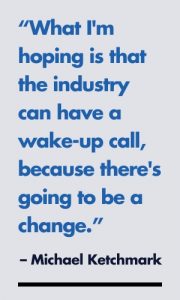Above, Michael Ketchmark, left and Anthony Lamacchia
Editor’s Note: Don’t miss Anthony Lamacchia along with Jessica Edgerton, Chief Legal Officer for LeadingRE and James Dwiggins, Co-Founder and CEO of NextHome, in an exclusive panel for brokers moderated by Darryl Davis, Founder of Darryl Davis Seminars and John Featherston, Founder and CEO of RISMedia on Wednesday, Feb. 7 at 3 p.m. EST. The panel will take a deep dive on the antitrust lawsuits facing the residential real estate industry and offer clarity and direction in navigating what changes may come to the real estate commission structure. Register for this can’t-miss event here.
Anthony Lamacchia and Michael Ketchmark debating “mano a mano” last week about the Burnett trial, the value of a buyer agent, mortgage flashpoints and more, was both informative and contentious. The hourlong, virtual Commission Lawsuit Debate hosted by HousingWire on Jan. 26 featured Ketchmark, lead attorney for the victorious Burnett plaintiffs, opposite Lamacchia, CEO of Massachusetts-based Lamacchia Companies and broker/owner of Lamacchia Realty, and a fierce critic of the aforementioned legal proceedings. Lamacchia earned boldness points when he challenged Ketchmark to debate, willing to punch above his weight class against a professional litigator who lives for verbal confrontation.
The format included opening statements, a series of questions for both and closing arguments. It proceeded calmly and courteously for the first half, then ramped up when Lamacchia asserted that Ketchmark had questionable connections in the Missouri legal and political arenas that could have given him an unfair advantage in court.
Ahead of the debate, Lamacchia told RISMedia that his intent was to shine a spotlight on the technicalities of the Burnett vs. NAR trial, which he believes put the defendants at an insurmountable disadvantage. His goal was to “substantially educate” the REALTOR® public. While Lamacchia and his firm have never been defendants in a commissions lawsuit, he set out to disprove some of Ketchmark’s self-promoting media messages.
The debate proved worthy of a championship fight, the combatants well prepared while bobbing and weaving, waiting for openings in which to throw sledgehammer verbal salvos. It took awhile, but both would soon find their opportunities to strike.
 “I am here as a lone wolf,” Lamacchia said in his opening statement. “I am not an attorney. I don’t represent any company, any organization, any defendant, anything but me and my feelings for the industry because I think it’s necessary given what’s going on with this case and given some of the rhetoric that’s come from Michael in the media.
“I am here as a lone wolf,” Lamacchia said in his opening statement. “I am not an attorney. I don’t represent any company, any organization, any defendant, anything but me and my feelings for the industry because I think it’s necessary given what’s going on with this case and given some of the rhetoric that’s come from Michael in the media.
“I didn’t comment anywhere until I saw Michael on CNBC calling us a ‘cartel,’ saying that we take money that doesn’t belong to us. And I was infuriated at that rhetoric, infuriated at what that infers for REALTORS®.”
Lamacchia also contended that the Burnett defendants were not able to present relevant information to the jury because the case was ruled to be “per se,” wherein certain categories or agreements are presumed to violate antitrust laws, regardless of other factors such as business purpose or competitive benefits, as opposed to a “rule of reason” case, wherein if any anti-competitive harm would be outweighed by the practice’s procompetitive effects, the practice is not unlawful.
Ketchmark was quick to counter.
“I don’t want to dehumanize REALTORS®; I have nothing against them,” he said. “I’ve heard you take offense to the word ‘cartel.’ Well, it’s not my word. It comes from the Sherman Antitrust Act that was passed in 1890. And the reason is that corporations back then were gaining tremendous power with their monopolies. And a cartel is not just a drug cartel. The definition of a cartel is when competitors get together to fix or set rules that stabilize prices, and that’s what’s happening.
“And what we did in our case is we looked at every single transaction in the state of Missouri and we found that this rule is being used to stabilize prices. And we knew if we presented that evidence at trial, that a jury would understand it, and they did understand it, and they believe that’s what’s going on and that’s what’s wrong. And so what I’m hoping is that the industry can have a wake-up call, because there’s going to be a change.”
Next was whether or not the Burnett trial was a “money grab” by the plaintiffs.
“It’s not the plaintiffs’ attorneys who are grabbing the money, it’s the defendants that grabbed the money,” Ketchmark maintained. “It’s the National Association of REALTORS® that set these rules up. Taking money that doesn’t belong to you as part of a system that props up commissions is absolutely wrong. And I am happy that I handled this case.”
Lamacchia’s rebuttal to that was that “everything NAR and its leaders have done has always been with the best interest of the consumer in mind.”
“So what Michael’s doing is, he’s trying to spin that into other things,” he said. “But if a seller wants to offer compensation to someone who brings them a buyer, that is their right. And the listing agreements are very explicit. They show total commission.”
When the talk got around to the value of buyer agents, the combatants were in essence, on the same page.
 “I’ve never said there’s no need for a buyer’s agent, or that the buyer of a home shouldn’t have their agent,” said Ketchmark. “Just don’t require the seller to pay for it. The issue is who was forced to pay for it. And the second issue I have with the current system is buyer agents receive the same payment regardless of their education, their quality or the amount of work they’ve done. There’s no question that Anthony’s a tremendous real estate agent. But why should an agent who does none of that be paid the same?”
“I’ve never said there’s no need for a buyer’s agent, or that the buyer of a home shouldn’t have their agent,” said Ketchmark. “Just don’t require the seller to pay for it. The issue is who was forced to pay for it. And the second issue I have with the current system is buyer agents receive the same payment regardless of their education, their quality or the amount of work they’ve done. There’s no question that Anthony’s a tremendous real estate agent. But why should an agent who does none of that be paid the same?”
While Lamacchia held his own, making salient points that his opponent could not cleanly pierce, Ketchmark proved his worth as a litigating wizard with ears akin to logic antennae that pick up the slightest slipup and signal a chance to move in for the kill.
“I hear about how the (Burnett) case was so limited and the defendants’ hands were tied,” said Lamacchia. “I learned a lot more about that courthouse and the people there that you’re related to. And it’s pretty clear we weren’t able to get a fair trial. So when you say the jury was on your side, well, when you’re in a boxing match and the defendant can’t use their arms, it’s a lot easier for you to win.
“Could we have done a better job in the courtroom? I don’t know. Then I started learning all kinds of things, like how Michael’s sister-in-law is a judge in the same court, like how two of the plaintiff attorneys and their wives are Facebook friends with the judge’s wife.. There’s political connections and there’s all kinds of things that make you kind of say, ‘Gee, that’s interesting, what’s going on there?’
“Could we really have gotten a fair trial? How was it decided so early that it was going to be a per se case? How was it decided so early that the defendants’ hands were going to be tied? I’m looking at this saying, ‘Is this Ketchmark’s courthouse?’”
Seizing the opportunity to attempt a knockout punch, the attorney immediately went on the loud offensive.
“When you attack the integrity of a court system, I’m going to stand up because that’s not right and that’s not appropriate,” he boomed. “There’s no question to me that the defense lawyers have been feeding a bunch of garbage, and what you just said is a bunch of garbage. You are now the mouthpiece for the corporate defendants who came to trial, put on their defense, had a fair time, argued and lost.
“Please do not attack the integrity of the court system. I won’t sit here quietly when you do that.
You want to lob bombs because my sister-in-law’s a judge? She has a right to work. Please do not demonize my sister-in-law. Offensive is what that is.”
Like an elite pugilist put on the canvas, Lamacchia was able to rise and counterpunch strongly when the talk turned to commissions and compensation, going so far as to put Ketchmark on the defensive over lawyer fees.
“At the trial I showed 15 different examples with the jury from the (NAR) webpage where they’re talking about commissions, saying we’re never negotiating commissions, to always set commissions,” Ketchmark said.
Then Lamacchia took over.
“I have never seen anywhere on NAR’s website about how much you should charge or anything about charging,” he said, gaining steam. “But the American Bar Association has it right on their website. The American Trial Association has it right on their website. Mike, do you think that’s right? I’ve been on hundreds and hundreds of listing appointments in my career where sellers are saying, ‘I got an agent that’ll only charge me X. I got an agent that’ll only charge me Y,’ always pushing back on commissions.
“There is more competition in our space than arguably any other space as far as consumers go. If I want to replace my driveway, there’s five local contractors I can call and probably three will call me back. If I want to replace the windows in my house maybe there’s 10 and maybe six will call me back. But if I want to sell my home, there’s 9,500 REALTORS® in greater Boston and probably 9,000 will come to my house the next day to list the home. And you’re trying to act like consumers don’t have any choices. It’s crazy to me.”
Lamacchia then argued that instead of aiding consumers, the Burnett decision could hinder them when it comes to lower-income homebuyers trying for mortgages. Ketchmark had posited that those earning under $140,000 a year in many states would qualify for a grant. In Missouri, “if you live in the house for seven years, you never have to pay it back.”
“That’s something that we helped get passed at NAR,” countered Lamacchia. “We passed an updated policy on supporting down payment assistance. The problem with those programs is they compete with the mortgage rules. The mortgage rules will say you have to make at least X in order to get the mortgage. And then the down payment assistance program says things like, well, you can’t get the assistance unless you only make Y.
“So Michael, I think you should stay away from mortgage finance, because just like I respect that I probably can’t beat you arguing about the Sherman Act, you’re not going to beat me arguing about mortgage regulations. It’s much harder than it sounds. And without a doubt, buyers are going to struggle.”
As the event came to a close, Lamacchia and Ketchmark exchanged cordialities, but this debate promises to continue on a grand scale for the foreseeable future.












